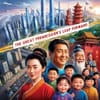China's transformation over the past few decades has been nothing short of remarkable. From a predominantly agrarian society in the late 1970s, China has grown into the world's second-largest economy, a global manufacturing powerhouse, and a key player in international politics and technology. This rapid development has not only transformed China's destiny but has also profoundly influenced the global economic landscape.
China's economic rise can be attributed to its strategic shift from a centrally planned economy to a market-oriented model, marked by the "Reform and Opening Up" policy introduced by Deng Xiaoping in 1978. Special Economic Zones (SEZs) were established in coastal regions, encouraging foreign investment, export-led growth, and industrialization. These reforms unleashed the productive potential of the Chinese people, leading to decades of sustained economic expansion.
China's development model has been driven by industrialization and infrastructure development, with massive investments in roads, railways, ports, and power plants. The country has transformed itself into the "world's factory," and its urbanization has accelerated rapidly, with over 65% of the population expected to live in cities by 2025. China's focus on innovation and technology has also led to significant advancements in fields like artificial intelligence, e-commerce, electric vehicles, and 5G technology.
China is leading the charge in the clean energy transition, with a focus on renewable energy, electric vehicles, and sustainable development. The country produces 70% of the world's electric vehicles and over half of its solar panels. China's clean energy transition is not only beneficial for the environment but also makes economic sense, given its limited oil reserves. The government has implemented policies to encourage the adoption of electric vehicles, such as making them cheaper to buy and license than traditional gas cars.
Despite its impressive growth, China's development has not been without challenges. The country still generates roughly 60% of its electrical power from coal, making it the biggest emitter of CO2. Additionally, China's authoritarian system has raised concerns about human rights and individual freedoms. The country's use of artificial intelligence is also likely to empower and prolong the control of the Communist Party.
China's rise has altered the global balance of power, making it a key player in international trade, global finance, and climate diplomacy. The country's development model, which combines state-led development with market mechanisms, has provided an alternative path for developing countries seeking rapid modernization. As the world navigates the complexities of the 21st century, China's role in shaping the global economic and political landscape will only continue to grow.


